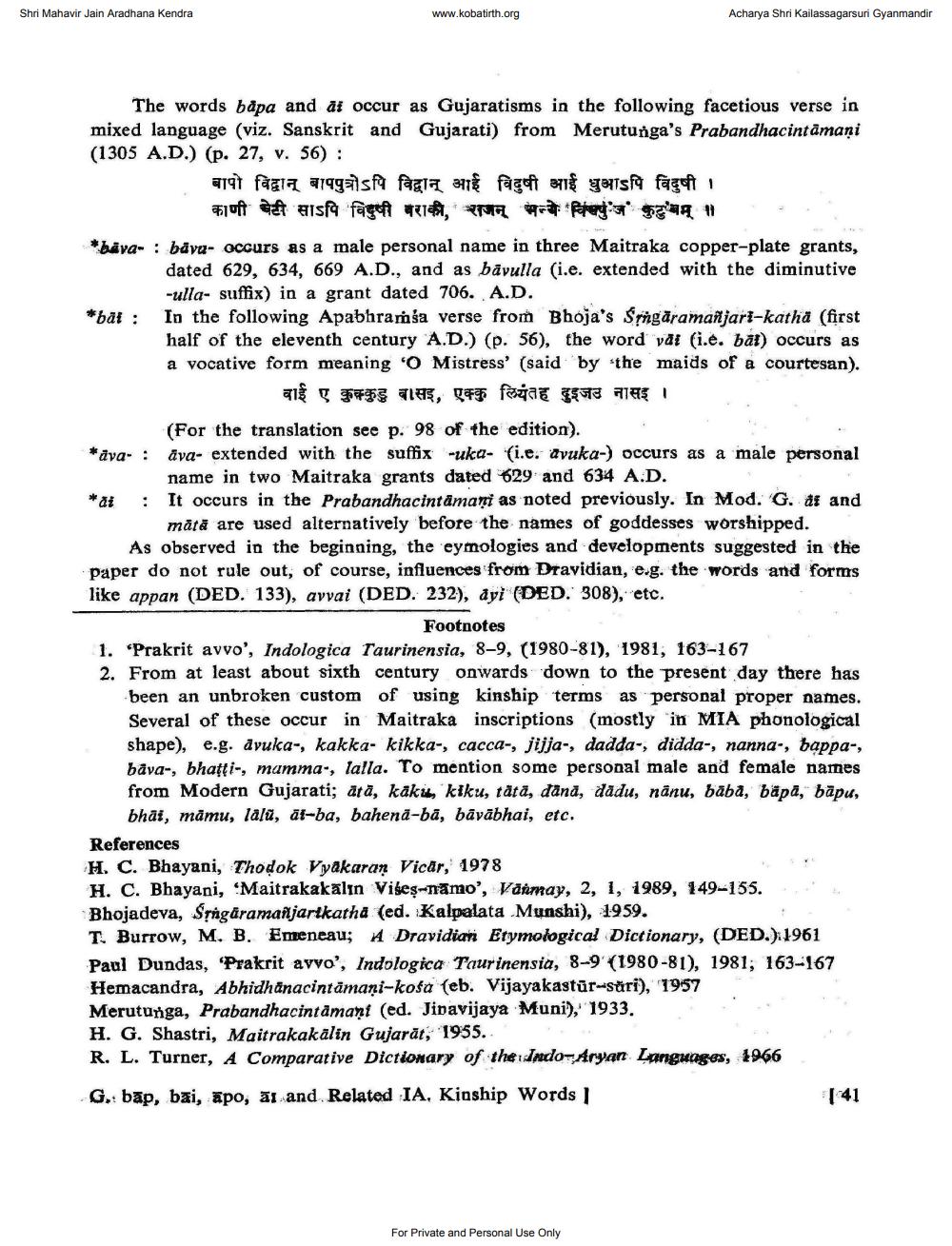________________
Shri Mahavir Jain Aradhana Kendra
www.kobatirth.org
The words bapa and at occur as Gujaratisms in the following facetious verse in mixed language (viz. Sanskrit and Gujarati) from Merutunga's Prabandhacintamani (1305 A.D.) (p. 27, v. 56):
*bat :
बापो विद्वान् बापपुत्रोऽपि विद्वान् आई विदुषी आई धुआऽपि विदुषी । काणी बेटी साऽपि विदुषी बराकी, राजन् अन्ये 'विष्णुंज' कुटुम् ॥
*bava: bāvu- occurs as a male personal name in three Maitraka copper-plate grants, dated 629, 634, 669 A.D., and as bavulla (i.e. extended with the diminutive -ulla- suffix) in a grant dated 706. A.D.
In the following Apabhramia verse from Bhoja's Sagaramanjart-katha (first half of the eleventh century A.D.) (p. 56), the word vai (i.e. bat) occurs as a vocative form meaning 'O Mistress' (said by the maids of a courtesan). बाई ए कुक्कुड बासह, एक्क नियंतह दुइजट नासर ।
*āva- :
Acharya Shri Kailassagarsuri Gyanmandir
(For the translation see p. 98 of the edition).
ava- extended with the suffix -uka- (i.e. avuka-) occurs as a male personal name in two Maitraka grants dated 629 and 634 A.D.
*ai
: It occurs in the Prabandhacintamani as noted previously. In Mod. G. at and mata are used alternatively before the names of goddesses worshipped. As observed in the beginning, the eymologies and developments suggested in the paper do not rule out, of course, influences from Dravidian, e.g. the words and forms like appan (DED. 133), avval (DED. 232), dyi (DED. 308), etc.
Footnotes
1. Prakrit avvo', Indologica Taurinensia, 8-9, (1980-81), 1981, 163-167 2. From at least about sixth century onwards down to the present day there has been an unbroken custom of using kinship terms as personal proper names. Several of these occur in Maitraka inscriptions (mostly in MIA phonological shape), e.g. avuka-, kakka- kikka-, cacca-, jijja-, dadda-, didda-, nanna-, bappa-, bava-, bhatti-, mamma-, lalla. To mention some personal male and female names from Modern Gujarati; ara, kaku, kiku, tāta, dana, dadu, nanu, baba, bapa, bapu bhāi, māmu, lalu, at-ba, bahenā-bā, bāvābhai, etc.
References
H. C. Bhayani, Thodok Vyakaran Vicar, 1978
H. C. Bhayani, Maitrakakalın Vises-namo', Vamay, 2, 1, 1989, 149-155. Bhojadeva, Srigaramaljartkatha (ed. Kalpalata Munshi), 1959.
T. Burrow, M. B. Emeneau; A Dravidian Etymological Dictionary, (DED.):1961 Paul Dundas, 'Prakrit avvo', Indologica Taurinensia, 8-9 (1980-81), 1981, 163-167 Hemacandra, Abhidhanacintamani-kofa (eb. Vijayakastür-sari), 1957
Merutunga, Prabandhacintamant (ed. Jinavijaya Muni), 1933,
H. G. Shastri, Maitrakakalin Gujarat, 1955.
R. L. Turner, A Comparative Dictionary of the Indo-Aryan Languages, 1966
G. bap, bai, xpo, är and Related IA. Kinship Words ]
For Private and Personal Use Only
[41




